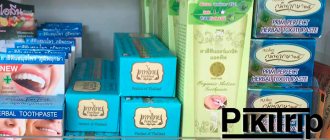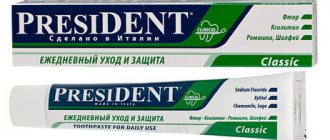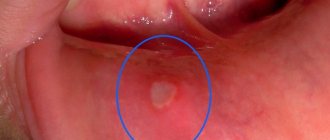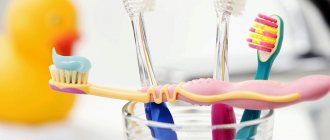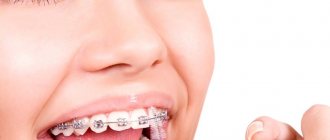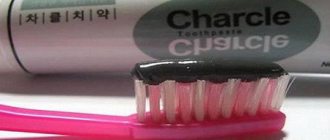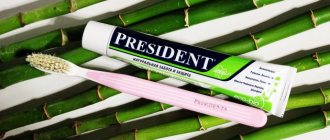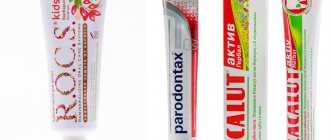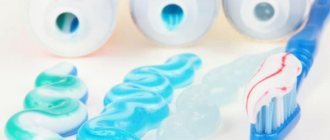Sorbitol has a mild sweetening effect and has some additional properties. Used in the pharmaceutical, food and cosmetic industries, laxatives.
It is added to toothpastes because of its sweet taste; this eliminates the use of sugar, which prevents the development of caries. Thanks to such effects, the texture acquires a pleasant taste.
What is the element sorbitol and where is it used?
A white chemical substance of crystalline type, odorless, which is used as an artificial sweetener in cakes and candies, food and industrial products.
The photo on the right shows the structural formula of the sorbitol molecule.
Sorbitol is characterized as a hexahydric alcohol with a sweet taste.
It is obtained through the hydrogenation reaction of glucose or from the fruits of stone fruits and rowan berries.
Sorbitol is produced naturally by our bodies, but is poorly absorbed.
In addition to the sweetening effect, sorbitol has a slight choleretic and detoxifying effect. It is almost not absorbed in the intestine due to the fact that pressure is formed in the intestinal lumen, leading to increased peristalsis. In case of overdose, a laxative effect is observed.
Sorbitol is an E420 food additive. Completely soluble in water and ethanol, with the exception of some oils.
By retaining moisture, it prevents the finished product from drying out. Therefore, sorbitol is also called a humectant
It is for this reason that it is used in cosmetology:
- in cosmetic masks for face and hair;
- toothpastes;
- shampoos;
- medicines;
- vitamins;
- deodorants:
- in the creation of ascorbic acid;
- aftershave lotions.
Almost always present:
- in carbonated drinks;
- as a thickener in cosmetics;
- chewing gum;
- in some dietary products;
- mouthwashes.
Additionally added to some candies.
What is food grade xylitol?
When buying toothpaste, you must definitely look at its composition and the order of the ingredients - the closer the component is to the beginning of the list, the more of it there is in the product. Harmful substances in toothpaste - list:
- Sodium lauryl sulfate (SLS), sodium laureth sulfate (SLES) are surfactants that produce thick foam. Surfactants have a very aggressive effect on the body, and when used in toothpaste they are doubly harmful. Surfactants destroy cells, which leads to weakening of the body, allergies and even Alzheimer's disease.
- Sodium coco sulfate (SCS) is a surfactant similar in origin and composition to SLS. It is believed that this substance is less toxic, but in reality it differs little from sodium lauryl sulfate, although SCS is often included in toothpastes advertised as an eco-product.
- Fluorine is a component from the category of “we treat one thing, we cripple another.” Fluoride is useful for preventing caries, but its excess leads to the destruction of bone and joint tissue, the formation of kidney stones and other serious problems. There is not much of this element in pasta, but fluorine is also found in many products, and in some regions - in water, which ultimately leads to an overdose. Fluorine in the product can be hidden under other names - tin fluoride, sodium fluoride, monofluorophosphate, amino fluoride.
- Triclosan is a strong antibiotic that destroys not only harmful, but also beneficial microflora. Chlorhexine, metronidazole, formaldehyde, propylene glycol and other components can be added to toothpaste as an antibiotic. With prolonged use of pastes with antibiotics, the oral microflora dies completely, which leads to an imbalance in the body.
- Aluminum lactate – one of the aluminum salts, is an anti-inflammatory component, reduces tooth sensitivity and bleeding gums. The harm of aluminum lactate is that it is absorbed and accumulates in the body, causing problems in the brain - memory loss, Alzheimer's disease, etc. In addition, aluminum salts remove calcium, disrupt hemoglobin synthesis, and provoke problems with joints and bones.
In addition to those already described, toothpaste often contains controversial components that can lead to problems. These substances include:
- glucosides, for example, coco glucoside, decyl glucoside, sodium lauryl sarcosinate, cocamidopropyl betaine - soft anionic surfactants;
- titanium dioxide – clarifier;
- saccharin is a synthetic sweetener that many doctors consider carcinogenic;
- sodium carboxymethylcellulose (sodium CMC) is a stabilizer that causes allergies, stomach upsets and other problems.
Small crystals that dissolve well in water, alcohol and some other liquids and taste sweet - this is xylitol. Its chemical properties are similar to those of other carbohydrates.
It is almost as sweet as sugar. True, the grains in this case are a little smaller. Its glycemic index is 7, in contrast to table sugar - 65.
C5H12O5 is the chemical formula of this substance. It absorbs water well and is often added to a variety of products as a stabilizer. By its nature, it is a polyhydric alcohol, otherwise they are also called sugar alcohols or polyols. By the way, polyols also include a substance with proven safety - erythritol. I already wrote about it, so you can read it too.
Receipt
The production of food-grade xylitol began at the end of the distant 19th century. Nowadays, just like a hundred years ago, it is obtained from plant raw materials - waste from corn processing, wood, as well as from berries and birch bark.
As you may have noticed from previous articles on various sugar substitutes, each has harmful and/or beneficial properties. So it is in this case. Let's first look at what the harm is, and then talk about the benefits of xylitol.
Manufacturers of sweets and soft drinks know xylitol as E967 - a food sugar substitute. It is what is most often included in treats that are intended for people suffering from diabetes, just like sorbitol.
Despite its more gentle effect on the body than sugar, you should not get carried away with this sweetener either. This recommendation is especially relevant for people prone to excess weight.
The fact is that its calorie content is almost the same as that of sugar - 240 kcal per 100 g. Therefore, you need to think very carefully before using it.
Since this sugar substitute does not taste different from sugar, you will add it the same amount as sugar. It turns out that the total calorie content of food will not decrease at all, although there will not be a strong increase in glucose and insulin levels. The weight gain effect may be similar to regular table sugar.
The glycemic index of xylitol is 13, while the GI of table sugar is about 65. The insulin index is 11. As a result, we can say that this substance still increases glucose and insulin levels.
To prevent patients from experiencing discomfort, doctors recommend that they use substances that can be considered as a harmless replacement for glucose for their body. One of these substances is xylitol. It is worth learning more about the features of this sweetener.
What is xylitol?
This product is well absorbed by the body and dissolves in water. The formula of xylitol is C5H12O5. Insulin is not needed for its absorption, which is why its use in people with diabetes is permitted.
This substance is naturally contained in many vegetables and fruits, from which manufacturers extract it. It can also be found in berries, corn husks, mushrooms, and birch bark.
Most often, it is obtained during the industrial processing of corn cobs or deciduous trees. It is a food additive (E967). The calorie content of the substance is 367 kcal per 100 g.
It does not contain proteins or fats, only carbohydrates.
Xylitol has stabilizing and emulsifying properties, therefore it is widely used in food production. But what is important for diabetics is that it is a sweetener. Thanks to this remedy, they have the opportunity not to give up their favorite food.
This food supplement is available in the form of crystalline powder. On sale you can find packages with different filling sizes: 20, 100, 200 g. Everyone can choose exactly the pack that best suits their needs. Some people actively use this substance, others are wary of it.
The scope of application of the product is the food industry. It is used to make food for people suffering from excess weight and diabetes.
The substance is suitable for the production of desserts, drinks, sausages, and chewing gum. It is also necessary for the production of hygiene products for the care of the oral cavity, ethers, some medicines, and synthetic resins.
Main functions of the substance:
- Emulsifying. This component provides a combination of substances and products that cannot be combined under normal conditions.
- Stabilizing. With the help of the substance, products retain their shape and consistency. This product also helps give them the desired look.
- Moisture retention. This feature is especially important in the production of meat products. This way it is possible to increase their mass.
- Adding flavor. Xylitol is a sweetener, but it has lower calorie content than sugar. It also improves the taste of some dishes and foods.
The dietary supplement can be used at home. It can be added to cookie dough, tea, desserts, etc.
It is also used medicinally to achieve effects such as:
- choleretic agent (20 g of the substance is added to tea or water);
- laxative (you need to add 50 g of xylitol to your drink);
- prevention of caries (6 g each);
- treatment of ENT diseases (10 g is enough).
But this product must be used with caution as it has certain features. If there are any pathologies in the body, you should consult a doctor before using it.
The beneficial features of xylitol include:
- restoration of the acid-base balance of the oral cavity;
- preservation of tooth enamel;
- prevention of plaque formation and caries development;
- prevention of nasal diseases;
- strengthening bones, increasing their density;
- prevention of osteoporosis;
- fight against bronchial asthma and allergic reactions.
There are undoubtedly benefits from this supplement. But we must not forget about the presence of harmful features. There are few of them and they appear only when xylitol is abused, as well as in the presence of intolerance.
These include:
- the possibility of gastrointestinal disorders (if the substance is consumed in an amount of more than 50 g per day);
- risk of allergic reactions;
- difficulties with the absorption of vitamins and minerals from food;
- accumulation in the body;
- likelihood of weight gain (the product has a high calorie content);
- pathological effect on the body of dogs (xylitol should not be allowed to get into their food).
Reviews about the product are quite varied. Some people appreciate the beneficial properties of xylitol in the food and medical fields. There are also those who are dissatisfied with the experience of using it. This is usually caused by improper use or unidentified contraindications.
In some cases, the use of this substance is prohibited. That is why you should not replace sugar with it.
The reason for the ban is contraindications, which include such features as:
- intolerance;
- diseases of the gastrointestinal tract;
- kidney disease;
- allergy.
The maximum benefit from this product can only be obtained if it is of high quality. Therefore, you need to know where to buy this nutritional supplement and how to store it so that it does not spoil ahead of time.
This ingredient is sold in stores and supermarkets selling healthy food products. It has a higher cost than sugar - the price for a 200 g package is 150 rubles.
After purchase, it is optimal to pour the substance into a glass jar and close it tightly with a lid. This will avoid the formation of lumps. The container should be stored in a dark place. Be sure to prevent moisture from getting into it.
Just because xylitol has hardened does not mean it should be thrown away. This substance has not lost its valuable properties. A sign of spoilage is a change in color. The edible additive must be white. Its yellow color indicates its unsuitability.
Why is it added to toothpastes, the benefits of sorbitol
Sometimes the sealing of the tube with toothpaste is broken, but do not worry if it contains sorbitol, because it is this that does not allow it to run out. In addition, it acts as a sweetener, which is especially important for delicate and sensitive people.
Sorbitol is used in the production of pasta, and this helps to avoid adding sugar to it, which prevents the development of caries. The texture of the composition becomes better and the taste is more pleasant.
In addition, sorbitol dissolves well in water, and its sweetness is two times lower than that of glucose and xylitol. It is usually derived from certain fruits: apples, pears, apricots, grapes, hawthorn. And its anti-caries effect is associated with a decrease in the production of organic acids in the enamel.
Analogs and price
Two sweeteners that are very popular today are sorbitol and xylitol (polyhydric alcohol). Many people are interested in what is better, which supplement has more benefits for the body?
Below is a comparative description of both products (the pricing policy for both ranges from 120 to 160 rubles):
- Both drugs are considered natural sweeteners and have the same nutritional value: xylitol per 100 grams - 370 calories, and its “opponent” - 360 calories.
- Hexahydric alcohol in powder has a specific taste, but it is less sweet than xylitol.
- Thanks to sorbitol, excess fluid leaves the body, and bile is also removed from the bladder. Both substances have a mild laxative effect and are often included in diabetic diets.
Is there any harm, is it possible during pregnancy?
Sorbitol in pastes is not dangerous unless you swallow them in large quantities.
It is when used internally in considerable quantities that sorbitol, due to the laxative enzyme, is absorbed into the intestines and causes diarrhea and problems with stool. It is especially unsafe if used instead of a drug. Sorbitol can cause flatulence, bloating, and worsen irritable bowel syndrome. As well as side effects in the form of: swelling, weakness, nausea, vomiting, thirst, dry mouth, chills, back pain, rhinitis, tachycardia and urinary retention.
The doses entering the body when accidentally swallowing the composition in an adult are tiny, so they cannot cause problems with stool, but this can affect the body of children in an unexpected way.
Since children often swallow a lot of toothpaste, it is better to buy products without sorbitol.
It is not advisable for people with irritable bowel syndrome to use dental products with sorbitol.
Pregnancy is not a contraindication to the use of toothpastes with sorbitol, but it is better to avoid taking products containing this element internally.
To understand whether it contains Sorbitol, it is worth studying the composition and significance of the components of the product for teeth.
The use of sorbitol for medicinal purposes (at home)
Researchers who studied the effects of sorbitol on the human body found that this product:
- Liquefies bile and ensures its outflow.
- Enriches the body with fluorine and calcium, strengthening the bone tissue of the skeleton and teeth.
- Strengthens intestinal motility.
- Cleanses the liver.
- Painlessly removes waste and toxins from the body.
- Normalizes blood and urine sugar levels.
- Cleanses the kidneys and blocks the inflammatory process in them.
- Eliminates constipation and intestinal obstruction.
- It has a positive effect on the condition of the epidermis, eliminating the unpleasant symptoms of peeling and itching.
- Removes excess water from the body and eliminates swelling.
- Reduces the consumption of B vitamins.
Sorbitol, which has a diuretic, choleretic and carminative effect, is successfully used to cleanse the liver and kidneys.
Sorbitol is often used for gentle, gentle cleansing of internal organs. Tubage, as this procedure is called, is used to treat the liver, kidneys and gall bladder.
This procedure is therapeutic, but also preventive. It prevents the formation of sand or stones in the gall bladder and kidneys. Prevents stagnation of bile, facilitates its passage through the bile ducts. At the same time, the carminative effect of the drug allows you to cleanse the intestines of decay products.
For this tubage, you need to dissolve 1 teaspoon of sorbitol in a glass of heated mineral water without gas. The resulting solution should be taken in 1 dose. After 30 minutes the procedure should be repeated.
Then you need to lie down on your right side, placing a warm heating pad in the liver area. So you should lie down for 1-1.5 hours. The effect of the drug will be felt after some time. There should be a tingling sensation in the area where the heating pad is applied. In addition, there will be a urge to defecate. People who periodically suffer from intestinal upset may experience diarrhea.
The cleansing procedure affects not only the internal organs. The color and condition of the skin improves. The threat of depression and fatigue disappears.
Sorbitol is strictly contraindicated for treatment of chronic calculous cholecystitis and the presence of kidney stones! Tubage in these cases is not acceptable under any circumstances!
Due to its composition and beneficial properties, this food supplement is used for dietary purposes, for allergy sufferers, diabetics, or for those who simply want to lose weight or give up sugar. In addition, sorbitol has the following beneficial properties:
- acts as a good laxative;
- helps with constipation;
- improves juice secretion and bile secretion in the stomach;
- stimulates the functioning of the intestines and the entire gastrointestinal system;
- improves intestinal microflora;
- has the ability to collect moisture, control water-salt balance;
- preserves in the body and promotes better absorption of vitamins, including B vitamins;
- useful for liver diseases;
- is a preventative against caries;
- stabilizes blood sugar levels;
- improves digestion;
- strengthens tooth enamel.
E420 is a white crystalline powder, less sweet than sucrose and has a strong cooling effect. Very hygroscopic - easily attracts moisture. A good humectant – helps foods resist changes in humidity. Solubility in water at 77°F (25°C) = 70 g/100 g solution or 235 g in 100 ml water. Melting point = 207°F (97°C). Heat resistance {amp}gt; 320 °F ({amp}gt; 160 °C).
More fresh and relevant information about health on our Telegram channel. Subscribe: https://t.me/foodandhealthru
Dental products without sorbitol
There are several dental products that do not contain this substance.
Jason Natural Sea Fresh
Stevia extract acts as a sweetener.
This product strengthens teeth without harsh abrasives or irritating ingredients. Made from plant-based natural ingredients, for example:
- mint and parsley extracts for mouth freshening;
- algae from the sea, which is rich in calcium, proteins and antioxidants, to strengthen teeth and gums;
- Aloe vera gel is added to soothe irritated gums.
Splat Special Organic
Splat Special Organic is specially made for sensitive tooth enamel and acts as a strengthener. Contains:
- aloe vera extract, which reduces inflammation and heals wounds;
- calcium lactate - to improve the properties of tooth enamel;
- tea tree extract - has antimicrobial properties, has a beneficial effect on the gums and prevents the rapid formation of plaque on the teeth, breaks it down.
Green People Natural Organic Children Mandarin & Aloe Vera Toothpaste
Remedy for children. It has no sweeteners and is 100% organic.
Chemical composition
Sorbitol is used in many industries:
- in cosmetology – for creating care and decorative cosmetics;
- in the food industry - to improve the taste of products and to extend shelf life;
- in pharmacology - to improve the taste of medicines, create the desired consistency of medicines and to enhance laxatives;
- in the creation of dietary products;
- in the confectionery industry.
100 grams contain 311.8 calories, of which 90.30 g carbohydrates and 1.93 g protein. Sorbitol contains:
- ash;
- water;
- carbohydrates;
- proteins;
- vitamins;
- microelements;
- macroelements.
Caution won't hurt
An important point of prevention: in the morning you need to brush your teeth with anti-caries paste, and in the evening with anti-inflammatory paste. But keep in mind: the latter can be used no longer than 2-4 weeks in a row, otherwise you can kill beneficial microorganisms along with the “pests” - the natural microflora of the oral cavity will be disrupted.
Be careful with whitening toothpastes. Some of them contain strong chemical oxidizers that can change the color of the fillings. Other bleaches contain abrasive ingredients that act as a “sandpaper” to polish surfaces. In general, whitening pastes should not be used more than 1-2 times a week; they are contraindicated if you are prone to caries, or for those who suffer from periodontal disease and hypersensitivity of tooth enamel.
Pastes that reduce tooth sensitivity cannot be used for a long time - this can “mask” the symptoms of dental diseases.

